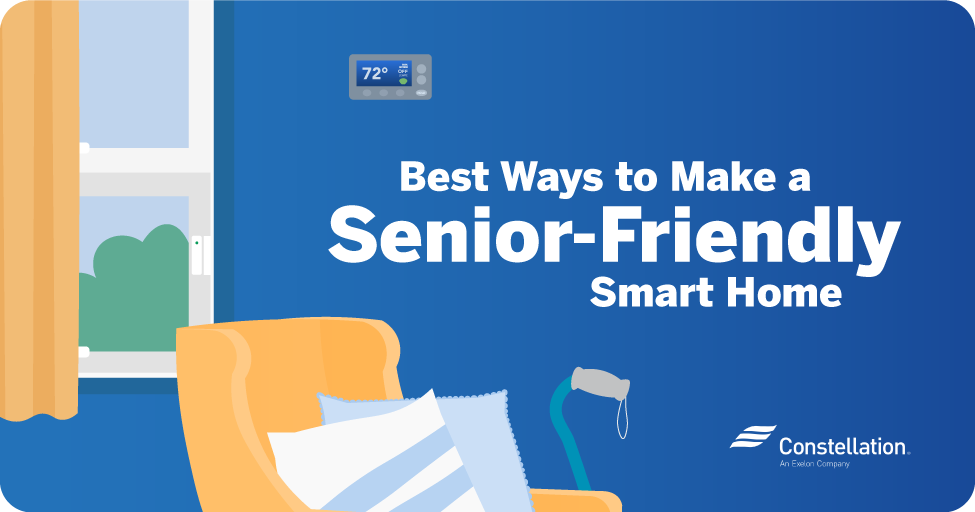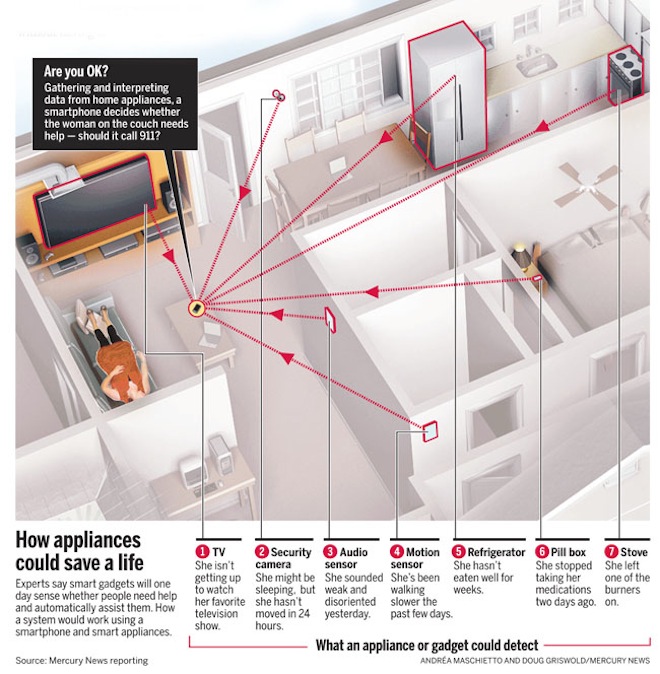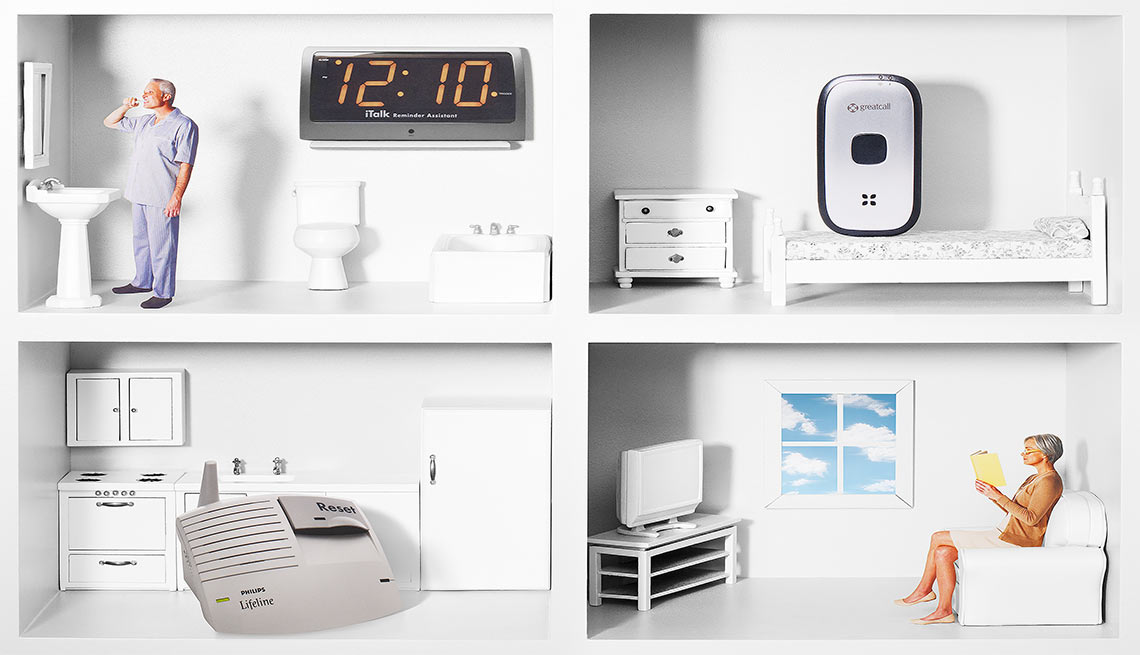As you or your loved ones age, maintaining independence becomes a top priority. The good news is that there are now smart home devices available that can help seniors live safely and comfortably in their own homes for longer. From medication reminders to fall detection systems, these innovative technologies provide peace of mind for both seniors and their caregivers. In this article, we will explore the various smart home devices designed specifically for seniors, highlighting their benefits and how they can enhance independence and wellbeing. Whether you are a senior looking to age in place or a caregiver seeking solutions, this article will provide valuable insights and recommendations to help you navigate the world of smart home devices for seniors.

This image is property of cdn.thewirecutter.com.
Aging in Place Safely: Smart Home Devices for Seniors and Independence
As we age, it’s natural for us to want to maintain our independence and live in the comfort of our own homes. Aging in place allows seniors to do just that, but it also comes with its own set of challenges. Fortunately, with the advancements in technology, we now have smart home devices that can assist seniors in their daily lives while ensuring their safety and security.
Importance of Aging in Place
Aging in place refers to the ability of seniors to live independently in their own homes, even as they grow older. This concept is important for a variety of reasons. Seniors often have a strong emotional attachment to their homes, and moving to an unfamiliar environment can be emotionally distressing. Additionally, aging in place allows seniors to maintain a sense of autonomy and control over their own lives. It promotes mental and emotional well-being and can even have positive effects on physical health.
Challenges Faced by Seniors
While aging in place offers many benefits, it also presents unique challenges for seniors. Physical limitations and health issues can make certain tasks difficult or dangerous. Seniors may struggle with mobility, memory loss, and other age-related conditions that can impact their ability to live independently. Additionally, the fear of accidents or emergencies can be a constant source of worry for both seniors and their loved ones. This is where smart home devices come into play.
Benefits of Smart Home Devices
Smart home devices provide a range of benefits for seniors who choose to age in place. These devices can enhance safety and security, monitor health and well-being, automate home tasks, and facilitate communication and socialization. By incorporating these devices into their homes, seniors can enjoy a greater sense of independence and peace of mind, while also easing the concerns of their loved ones.
Safety and Security
Smart Locks
Smart locks offer a convenient and secure way for seniors to control access to their homes. These locks can be operated remotely using a smartphone or can even be voice-activated, eliminating the need for physical keys. Seniors no longer have to worry about forgetting their keys or fumbling with traditional locks. Smart locks also allow for easy access control, enabling seniors to grant entry to caregivers or family members without needing to be physically present.
Video Doorbells
Video doorbells provide an added layer of security by allowing seniors to see and communicate with visitors without having to open the door. This feature is particularly useful for seniors who may be vulnerable to scams or thefts. With a video doorbell, seniors can verify the identity of the person at the door before granting them access.
Motion Sensors
Motion sensors are an essential component of a smart home security system. These sensors can detect movement and trigger an alert if any unusual activity is detected. For seniors, motion sensors can provide peace of mind by notifying them or their caregivers of any unexpected movement within their homes. This can help prevent accidents, identify potential intruders, and ensure the overall safety of the living environment.
Panic Buttons
Panic buttons are wearable devices that allow seniors to quickly call for help in case of an emergency. These small, portable devices can be worn as a pendant or wristband and provide a direct line of communication to emergency services or designated contacts. With the press of a button, seniors can summon help, whether it’s for a medical emergency, a fall, or any other urgent situation.
Surveillance Cameras
Surveillance cameras provide an added layer of security for seniors living alone. These cameras can be strategically placed around the home to monitor the premises and record any suspicious activity. Seniors can access live feeds from their smartphones or tablets, allowing them to keep an eye on their homes even when they’re away. Surveillance cameras not only help prevent crimes but also provide valuable evidence in case of incidents.

This image is property of cdn.thewirecutter.com.
Health Monitoring
Wearable Devices
Wearable devices, such as smartwatches or fitness trackers, can help seniors monitor their health and well-being. These devices can track vital signs, activity levels, sleep patterns, and even provide medication reminders. By keeping a close eye on their health, seniors can proactively manage their conditions and seek medical attention when necessary.
Smart Pill Dispensers
Smart pill dispensers are designed to simplify medication management for seniors. These devices can be programmed to dispense medications at specific times, remind seniors to take their medication, and even send alerts to caregivers or family members if doses are missed. Smart pill dispensers help ensure that seniors take their medications as prescribed, reducing the risk of medication errors or missed doses.
Fall Detection Systems
Falls are a common concern for seniors, and fall detection systems can provide an added layer of safety. These systems use sensors or wearable devices to detect falls and automatically trigger an alert for help. Whether it’s through a smartphone app or a monitoring center, fall detection systems can quickly notify caregivers or emergency services, allowing for timely intervention and potentially saving lives.
Home Automation
Voice-Activated Assistants
Voice-activated assistants, such as Amazon Alexa or Google Assistant, can make everyday tasks easier for seniors. Through voice commands, seniors can control various aspects of their homes, such as adjusting the temperature, turning on lights, playing music, setting reminders, and even making phone calls. These assistants provide a hands-free way of managing the home, allowing seniors to conserve their energy and focus on more important activities.
Smart Lighting
Smart lighting systems offer convenience, safety, and energy efficiency for seniors. These systems can be programmed to automatically turn on or off at specific times, respond to motion sensors, or be controlled remotely using a smartphone. Smart lighting can provide improved visibility, reduce the risk of accidents caused by poor lighting, and even simulate occupancy when seniors are away, enhancing home security.
Smart Thermostats
Smart thermostats allow seniors to easily control the temperature of their homes and make energy-saving adjustments. These devices can be programmed to maintain comfortable temperatures throughout the day and can even learn and adapt to seniors’ preferences over time. Smart thermostats offer convenience, energy efficiency, and cost savings, all while ensuring a comfortable living environment for seniors.
Remote Access Control
Remote access control allows seniors to monitor and control various aspects of their homes from anywhere using a smartphone or tablet. From adjusting the thermostat to locking doors or checking surveillance camera feeds, seniors have complete control over their homes even when they’re away. This feature provides peace of mind and enables seniors to stay connected with their homes and loved ones, regardless of their physical location.

This image is property of blog.constellation.com.
Communication and Socialization
Video Calling Devices
Video calling devices, such as tablets or specialized communication systems, allow seniors to stay connected with their loved ones. These devices provide a visual and interactive way of communicating, which can be particularly important for seniors who may have limited mobility or live far away from family and friends. Video calling devices facilitate virtual visits, reduce feelings of loneliness, and promote social engagement.
Social Media Apps
Social media apps offer seniors the opportunity to connect with others, share experiences, and stay up to date with the latest news and events. Platforms like Facebook, Instagram, and Twitter provide a space for seniors to connect with family, friends, and even join online communities related to their hobbies or interests. Social media apps can foster a sense of belonging, promote social interaction, and combat isolation.
Electronic Reminder Systems
Electronic reminder systems can help seniors stay organized and remember important tasks or appointments. These systems can be in the form of smartphone apps, voice-activated assistants, or specialized devices. Seniors can set reminders for medication schedules, daily routines, upcoming events, or even basic tasks like drinking enough water. Electronic reminder systems assist in maintaining independence and reducing the likelihood of missed appointments or tasks.
Assisted Living Technologies
Robot Companions
Robot companions offer companionship and assistance for seniors living alone. These robots can engage in conversation, play games, provide reminders, and even assist with certain tasks, such as fetching objects or helping with household chores. Robot companions simulate human interaction and can provide emotional support for seniors, reducing feelings of loneliness and isolation.
Smart Wheelchairs
Smart wheelchairs incorporate advanced technology to enhance mobility and independence for seniors with mobility limitations. These wheelchairs can be controlled using voice commands or sensors, allowing for greater maneuverability and control. Smart wheelchairs can also be equipped with features such as obstacle detection and avoidance, customizable seating options, and even integration with mobile devices or home automation systems.
Smart Home Hospitals
Smart home hospitals are specialized environments designed to provide medical care and monitoring for seniors within the comfort of their own homes. These advanced systems use a combination of smart home devices, remote monitoring, and telehealth technologies to deliver personalized healthcare services. Smart home hospitals can monitor vital signs, provide medication reminders, facilitate video consultations with healthcare professionals, and even detect early signs of health issues, all while allowing seniors to remain in familiar surroundings.

This image is property of changingaging.org.
Privacy and Security Concerns
While smart home devices offer numerous benefits, it’s essential to address privacy and security concerns. Seniors must ensure that their devices are properly secured, including setting strong passwords, enabling two-factor authentication, and keeping software up to date. Additionally, it’s important to carefully review privacy policies and understand what data is being collected and how it is used. Seniors should also be cautious when sharing personal information or granting access to their smart home devices.
Cost Considerations
When considering smart home devices for aging in place, cost can be a significant factor. While some devices can be relatively affordable, others may require a more significant investment. It’s important for seniors and their families to assess their needs, set a budget, and prioritize the devices that provide the most value for their specific situation. Many devices also offer subscription plans or financing options to help manage the cost over time.

This image is property of cdn.aarp.net.
Conclusion
Aging in place can be a fulfilling and empowering choice for seniors, and smart home devices can greatly enhance their safety, independence, and overall well-being. From safety and security features to health monitoring, home automation, communication, and assisted living technologies, there is a wide range of smart home devices available to cater to the unique needs of seniors. By embracing these devices, seniors can maintain their independence, stay connected with loved ones, and enjoy a comfortable and secure living environment.
